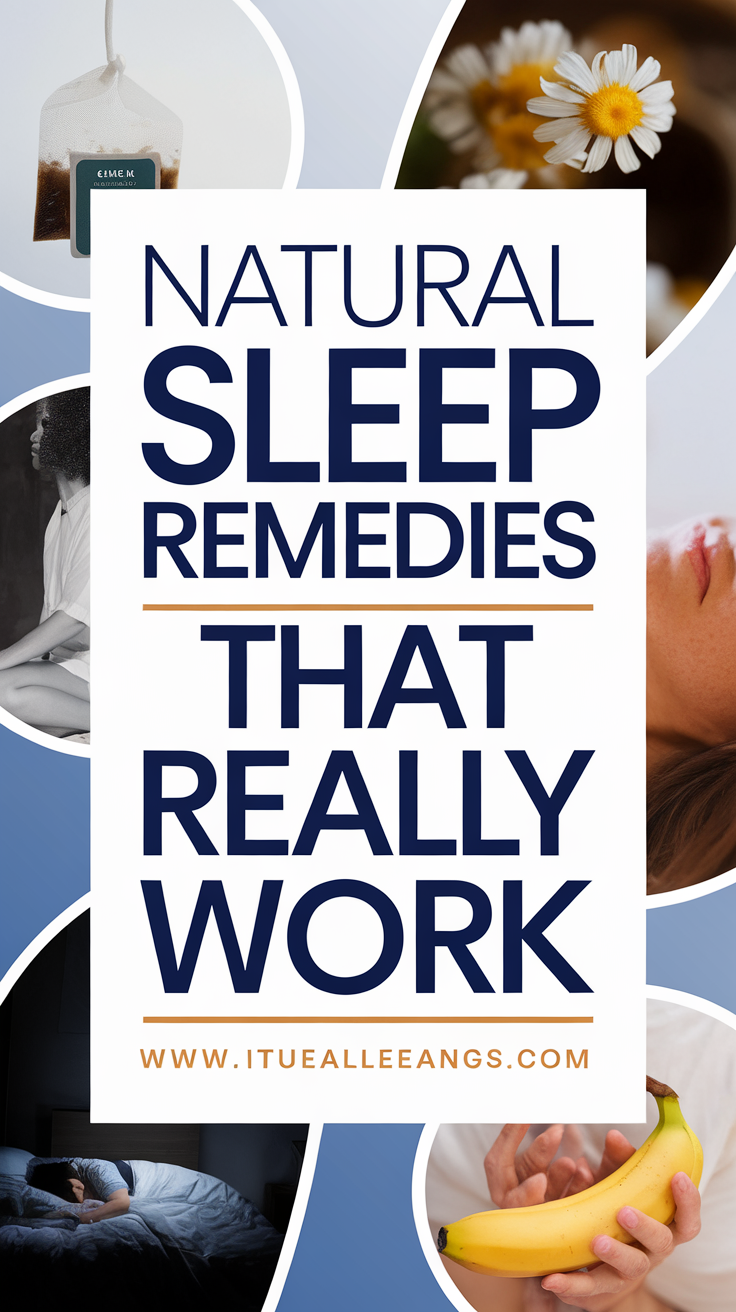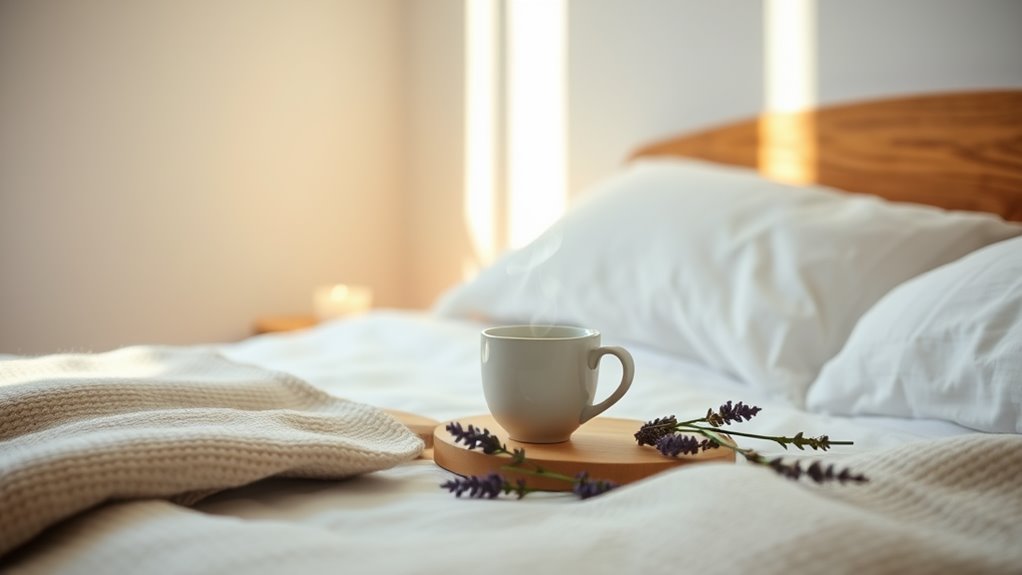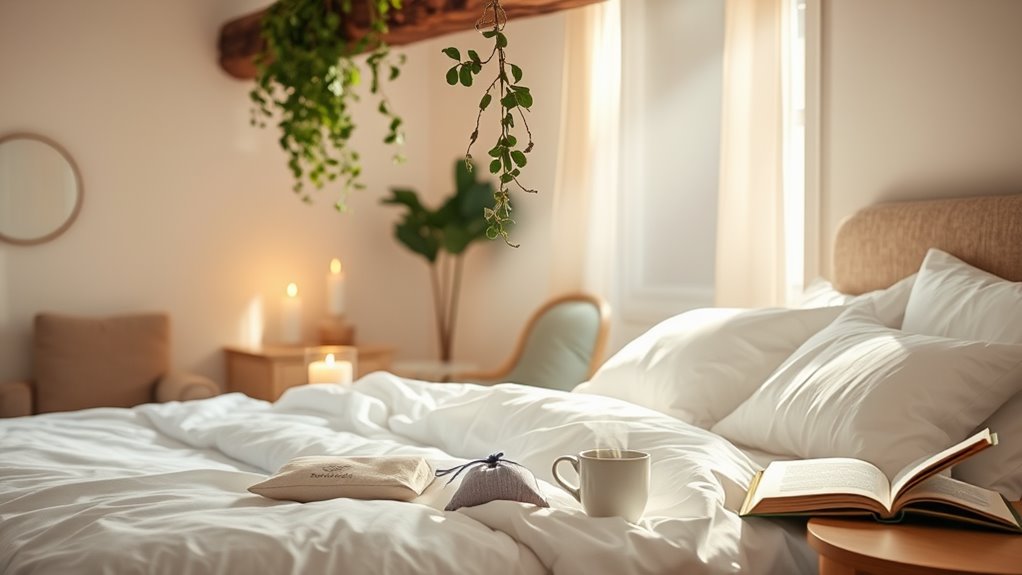Natural Sleep Remedies That Really Work
If you’re looking for natural sleep remedies that really work, consider herbal options like valerian root and chamomile tea. These can help you fall asleep faster and improve your overall sleep quality. You might also try melatonin supplements to regulate your sleep-wake cycle or lavender essential oil for relaxation. Don’t forget to establish a consistent sleep schedule and create a calming bedtime routine. Eating magnesium-rich foods and avoiding caffeine close to bedtime can make a big difference too. There’s so much more you can explore to enhance your rest and well-being, so keep going!
Importance of Sleep Quality
Sleep quality plays a crucial role in your overall health and well-being. When you get good sleep, your body can repair itself, boosting your immune system and improving cognitive function. On the flip side, poor sleep can lead to a host of issues, like fatigue, irritability, and reduced focus. You might find it challenging to make decisions or manage stress effectively when you’re sleep-deprived.
Additionally, sleep quality impacts your emotional health. If you’ve ever felt anxious or overwhelmed after a restless night, you know the connection between sleep and mood. Consistent, restorative sleep helps regulate hormones that control stress and emotions, making it easier for you to handle daily challenges.
Moreover, the benefits of quality sleep extend to your physical health. It supports weight management, lowers the risk of chronic conditions, and enhances your cardiovascular health. Prioritizing sleep isn’t just a luxury; it’s a necessity for optimal functioning in all areas of your life. By understanding the importance of sleep quality, you can make informed choices to enhance your nightly rest. So, focus on creating a sleep-friendly environment and establish a calming bedtime routine for better sleep outcomes.
Herbal Supplements for Sleep
Many people turn to herbal supplements as a natural way to improve their sleep quality. These remedies have been used for centuries, and many find them effective. One popular option is valerian root, which may help reduce the time it takes to fall asleep. You can easily find it in capsule or tea form. Another well-known herb is chamomile, often consumed as a soothing tea before bedtime. Its mild sedative properties can promote relaxation, making it easier for you to drift off.
Passionflower is another herbal supplement worth considering; it’s known for its calming effects and may help with anxiety-related sleep issues. If you prefer liquid supplements, try melatonin, a hormone that regulates sleep-wake cycles. It’s available in various forms, including gummies and capsules.
Before you start any herbal supplement, it’s essential to consult with a healthcare professional, especially if you’re taking other medications or have underlying health conditions. Remember, everyone’s body reacts differently to supplements, so what works for one person might not work for you. Take the time to find what suits your needs best, and enjoy the journey to better sleep!
Lifestyle Changes to Enhance Sleep
Making simple lifestyle changes can significantly enhance your sleep quality. Start by establishing a consistent sleep schedule. Going to bed and waking up at the same time every day helps regulate your body’s internal clock, making it easier to fall asleep and wake up refreshed.
Next, pay attention to your diet. Avoid heavy meals, caffeine, and alcohol close to bedtime, as these can disrupt your sleep. Instead, consider lighter snacks that promote sleep, like bananas or almonds.
Incorporating regular physical activity into your routine can also boost your sleep. Aim for at least 30 minutes of moderate exercise most days, but try to finish your workout at least a few hours before bedtime to avoid overstimulation.
Creating a sleep-friendly environment is crucial too. Keep your bedroom dark, quiet, and cool. Consider using blackout curtains, earplugs, or a white noise machine to minimize disturbances.
Lastly, manage your stress levels. Practicing relaxation techniques such as deep breathing or meditation can help you unwind, making it easier to drift off to sleep when the time comes. By making these changes, you’re setting the stage for a more restful night’s sleep.
Bedtime Routines for Better Rest
Establishing a calming bedtime routine can significantly improve your sleep quality. Start by setting a consistent sleep schedule. Going to bed and waking up at the same time each day helps regulate your body’s internal clock, making it easier to fall asleep and wake up refreshed.
Next, create a sleep-friendly environment. Dim the lights an hour before bed to signal your body that it’s time to wind down. You might also want to keep your bedroom cool and quiet, reducing distractions that can disrupt your sleep.
Incorporate calming activities into your routine. Whether it’s reading a book, taking a warm bath, or practicing gentle stretching, find what relaxes you the most. Avoid screens during this time, as the blue light emitted by phones and computers can interfere with melatonin production.
Lastly, consider journaling to clear your mind. Jotting down your thoughts or a to-do list for the next day can help alleviate any lingering stress. By establishing a calming bedtime routine, you’ll not only prepare your mind and body for sleep but also create a more restful atmosphere conducive to better rest.
Relaxation Techniques and Practices
Incorporating relaxation techniques into your daily routine can significantly enhance your ability to unwind and prepare for sleep. By integrating these practices, you’ll not only reduce stress but also signal to your body that it’s time to transition into rest. Here are a few effective techniques to consider:
-
Deep Breathing: Focus on slow, deep breaths to calm your mind and body. Try inhaling for a count of four, holding for four, and exhaling for four. Repeat this cycle several times.
-
Progressive Muscle Relaxation: This involves tensing and then relaxing each muscle group in your body, starting from your toes and moving up to your head. It helps release physical tension that might be keeping you awake.
-
Mindfulness Meditation: Spend a few minutes focusing on the present moment, letting go of racing thoughts. You can use guided meditations or simply concentrate on your breath.
Nutrition’s Role in Sleep Health
What you eat plays a crucial role in how well you sleep. A balanced diet can significantly enhance your sleep quality. Foods rich in magnesium, like leafy greens, nuts, and seeds, help relax your muscles and calm your nervous system. Incorporating complex carbohydrates, such as whole grains and legumes, can increase serotonin levels, promoting better sleep.
You should also consider your protein intake. Consuming lean proteins, like turkey and chicken, can provide tryptophan, an amino acid that aids in the production of melatonin, the hormone responsible for regulating sleep.
On the flip side, avoid heavy meals, caffeine, and alcohol close to bedtime. These can disrupt your sleep cycle and make it harder to fall asleep. Instead, opt for a light snack, like yogurt or a banana, to stave off hunger without overwhelming your digestive system.
Remember to stay hydrated throughout the day, but limit fluids right before bed to prevent nighttime trips to the bathroom. By making mindful choices about what you eat, you can create an environment in your body that supports restful, restorative sleep.
Environmental Factors for Sleep Improvement
Creating a sleep-friendly environment can make a significant difference in the quality of your rest. Pay attention to the factors that influence your sleep space. Small adjustments can lead to a more restful night.
First, consider the temperature of your bedroom. Ideally, keep it between 60 to 67 degrees Fahrenheit. This range helps your body lower its core temperature, promoting better sleep.
Next, focus on light control. Invest in blackout curtains or a sleep mask to block out any unwanted daylight. Reducing light exposure signals your brain that it’s time to wind down.
Finally, think about noise levels. If you live in a noisy area, use earplugs or a white noise machine to create a consistent sound environment. This can mask disruptive noises and help you stay asleep longer.
- Maintain a cool temperature (60-67°F).
- Use blackout curtains or a sleep mask.
- Employ earplugs or a white noise machine.
Frequently Asked Questions
Are There Any Side Effects of Using Natural Sleep Remedies?
Yes, there can be side effects from natural sleep remedies. You might experience drowsiness, headaches, or digestive issues. It’s important to consult with a healthcare professional before trying any new treatments to ensure they’re safe for you.
How Long Does It Take for Natural Remedies to Work?
It usually takes anywhere from 30 minutes to a couple of hours for natural remedies to kick in. You might notice improvements in your sleep quality gradually, depending on the remedy and your individual body chemistry.
Can I Combine Different Sleep Remedies Safely?
Yes, you can combine different sleep remedies safely, but it’s important to research each one. Monitor how you feel, and consult a healthcare professional if you’re unsure or experience any adverse effects. Balance is key!
Are Natural Sleep Remedies Effective for Chronic Insomnia?
Yes, natural sleep remedies can be effective for chronic insomnia. You might find that options like herbal teas, melatonin, or relaxation techniques help improve your sleep quality, but results can vary from person to person.
What Should I Avoid When Using Sleep Remedies?
When using sleep remedies, avoid alcohol, caffeine, and heavy meals close to bedtime. Don’t mix different remedies without consulting a doctor, and steer clear of using them for extended periods without professional guidance.





